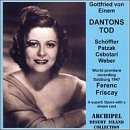| All Artists: Gottfried von Einem, Ferenc Fricsay, Ferenc Friscay, Vienna Philharmonic Orchestra, Maria Cebotari, Joseph Witt, Julius Patzak, Peter Klein, William Wernigk, Georg Hann, Herbert Alsen, Paul Schöffler, Rosette Anday, Wilhelm Felden Title: Von Einem: Dantons Tod Members Wishing: 1 Total Copies: 0 Label: Archipel Release Date: 10/17/2000 Album Type: Import Genre: Classical Style: Opera & Classical Vocal Number of Discs: 2 SwapaCD Credits: 2 UPCs: 675754283629, 7640104000099 |
Search - Gottfried von Einem, Ferenc Fricsay, Ferenc Friscay :: Von Einem: Dantons Tod
 | Gottfried von Einem, Ferenc Fricsay, Ferenc Friscay Von Einem: Dantons Tod Genre: Classical
|
Larger Image |
CD Details |
CD ReviewsA top historic recording of a rare opera geoffh | Bolton United Kingdom | 08/01/2003 (5 out of 5 stars) "Gottfried von Einem's opera Danton's Tod (Danton's Death) was first performed in 1947 at the Salzburg Festival and is only rarely heard. The world premiere was conducted by Ferenc Fricsay (with the Vienna Philharmonic Orchestra) and it is this recording that features here. The opera opens with a strident sequence of chords and a moody overture which sets the scene for the dark political machinations that follow. The music and style of the opera are not really suitable for those of you starting out with opera, but if you are a seasoned opera fan then this may take you into a new world. The recorded sound (mono) is pretty good for a 1947 live performance - but it obviously doesn't live up to today's standards if that is what you require. The performance itself is, in my opinion, superb. It was this performance that launched Ferenc Fricsay, deservedly, onto the world stage as a conductor and his gift for interpreting new music is clearly felt. Other recordings are difficult to come by, but the few I've heard do not match the interpretation of this one." Riveting, fiery music and drama - superb performances but on G.D. | Norway | 05/13/2010 (4 out of 5 stars) "Gottfried von Einem (1918-1996) achieved a huge success with the 1947 premiere of his opera Danton's Tod. Its subsequent success at opera houses around Europe was presumably also due to the plot (the theme being institutionalized governmental terror) as presented by a young Austrian who had not been involved with the Nazi regime, in addition to the powerfully dramatic nature of the music. But there is no doubt that the success was deserved, for this is a really stirring score; stylistically it is relatively conservative, influenced by Blacher and perhaps Orff, and combines late romantic sensibility with slightly more modern elements, with a personal touch to it and some striking melodic material which is developed with a sure hand into a taut, effective and fervent drama. It doesn't exactly suffer from the power of Georg Buchner's drama, as adapted by Blacher and the composer himself, either. There are some riveting vocal sequences here, although much of the singing is declamatory. The vocal performances are consistently strong, however - the male roles perhaps in particular. Still, it is the Vienna Philharmonic under Ferenc Fricsay who steals the laurels, with playing of concentration and blazing intensity. The performance was also Ferenc Fricsay's professional breakthrough - it is no wonder why, but it is certainly a wonder how he manages to shape and mould the drama, in particular the superb trial scene. On the downside, the sound is no more than adequate, and often not even that. It is noisy mono sound with lots of stage noise and questionable balance. The busier scenes are sometimes almost intolerable, frail and dim. Still, it is sufficiently decent to allow the performances to make the necessary impact, and if sound quality isn't your main concern you will surely be bowled over by the impact of this excellent work and the superb performances. I have not heard any alternative recordings of this work and doubt that there are any better ones performancewise (although apparently the revised score is even more effective dramatically). Strongly recommended with the proviso that the sound is no better than tolerable." A very strong overlooked opera Santa Fe Listener | Santa Fe, NM USA | 05/15/2007 (5 out of 5 stars) "It has taken me a long time to get around to von Einem's splashy, intensely theatrical Dantons Tod, even though I was aware of its high reputation in Germany. Like Pfitzner's Palestrina, the work hangs on in Germain opera houses but is totally ignored in Britain and America. This is the premiere performance from 1947 in servicable radio sound, mono of course, but with plenty of intrusive stage noises. Since the pitch isn't distorted, the sound didn't bother me, but newcomers to historical sound be warned. As for the performance itself, Fricsay leads with white-hot intensity, and it's only a pity that the big crowd scenes during the Reign of Terror, so essential to the opera's dramatic impact, sound distant and murky.
As for von Einem's musical idiom, it's moernist conservative, like Orff, "Zemlinky, and Pfitzner. The music reels and punches, with a great deal of well calculated melodrama, and since the basis was Georg Buchner's searing stage play (Buchner was the author of Woyzeck, made into Berg's opera, Wozzeck), von Einem wisely makes much of the singing declamatory, leading up to the riveting trial where Danton confronts his tormentor, the evil despot Robespierre. Any listener who has a taste for Wozzeck will find von Einem equally brutal and psychological but musically much closer to film music. This particular staging from Salzburg launched Fricsay as a major conductor, and given the equally committed soloists, Daontons Tod couldn't have had a more auspicious launch. Every voice--Schoffler, Patzak, Cebotari, and Webber--is beyond criticism. P.S. For those who want updated sound, there's a stereo recording of a concert performance on Orfeo. It has a good reputation but lacks the incendiary power of this set." |

 Track Listings (12) - Disc #1
Track Listings (12) - Disc #1